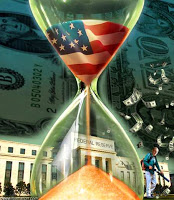 |
| Dees Illustration |
Simon Black
Sovereign Man
For the last few days, we’ve been having an important discussion about the magnitude of the economic challenges in the west; if you didn’t read yesterday’s letter, I really encourage you to do so before proceeding because it’s important to understand why the west has truly passed the point of no return.
Simply put, the United States and much of Europe are borrowing an extraordinary amount of money now just to pay interest on the money they’ve already borrowed. They cannot even self-fund their mandatory entitlement programs without going into the hole, and their options are limited:
Option 1: Continue borrowing, keep the party going.
As long as the government CAN do this, they WILL do this. Regardless of their intentions, though, more debt only worsens the situation, creating higher borrowing costs in the long run, and even more debt. As this happens, the pool of buyers begins to dry up, especially from overseas.
Option 2: Inflation
The more buyers stop purchasing Treasury securities, the more the Federal Reserve will mop up the excess liquidity. In doing so, the Fed essentially conjures up money and loans it to the government.
No matter what the government monkey statistics say, this is inflationary, plain and simple. The more money they print, the greater the level of inflation in the long-term. Meanwhile, as foreigners simultaneously reduce their US dollar holdings, this inflation will become more acutely felt in the US.
Option 3: Austerity
There’s going to come a time when the US government is forced to face its economic reality and make some incredibly deep cuts that would be felt across society, from Wall Street and the military industrial complex to project housing on the other side of the tracks.
Option 4: Default
Eventually, the debt burden is simply going to be too much, and the most obvious solution will be to default. Politicians will make China out to be the enemy and they will probably invent a war just to have an excuse to default on Chinese owned debt. Americans will wave the flag and celebrate defaulting on their enemies.
Option 5: Economic Cannibalism
In the best traditions of Atlas Shrugged, the government will continue its persecution of the productive class– professionals, investors, entrepreneurs, and skilled workers. Existing taxes will rise, new taxes will be created, trade barriers will be enacted, and a maze of cost prohibitive regulations will be passed.
 The first option (keeping the party going) is what has been happening for years. Politicians make small concessions to show they’re “serious” about fiscal discipline, cutting laughably small programs while dumping hundreds of billions of dollars into wars and entitlement programs.
The first option (keeping the party going) is what has been happening for years. Politicians make small concessions to show they’re “serious” about fiscal discipline, cutting laughably small programs while dumping hundreds of billions of dollars into wars and entitlement programs.
The worse the debt situation becomes, though, the higher the borrowing costs become, and the worse the debt situation becomes. It’s not an enviable position. Existing lenders will continue backing away from the US Treasury market, giving option 1 a half-life measured in months at best.
In the longer term, only options 2-5 remain: inflation, austerity, default, and cannibalism. Each of these remaining options will shake the financial system to its core. More importantly, each of these has the power to create widespread social upheaval.
When inflation eats away at a family’s already meager standard of living, when austerity eliminates the benefits to which recipients have grown accustomed, when default vanquishes a retiree’s savings, when high taxes make workers feel like they’re just government serfs– this is when the real turmoil will begin:


Be the first to comment on "What Are the Social Implications of Economic Collapse?"